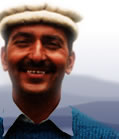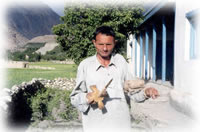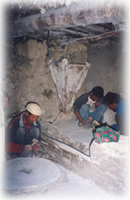 |
 |
||
 |
|||
|
RELATED THEMES culture and customs environment livestock tourism OTHER LOCAL THEMES BACKGROUND |
traditional skills
Whilst there is undoubtedly a significant portfolio of Shimshal-based skills, certain skills are attributed to outsiders. For example, Shafa (Pakistan 5) explains how he learnt carpentry skills: "I am a carpenter… Sultan Ali came to our village as a carpenter, from Gulmit… [We] observed the work and gradually we started working with them… [and] got the opportunity to learn this work." Similarly, some "female" skills such as particular knitting and embroidery designs are attributed to women who have married into Shimshal from nearby villages. Individuals from Shimshal are also remembered in connection with their expertise and contribution to the community. The three mountaineers interviewed in this collection have evidently improved their skills through experience of international expeditions. However, climbing and mountaineering can to some extent be referred to as a local skill. Since Shimshal was first settled, its people have traversed steep slopes and glaciers to come in and out of the community and visit the high pastures. quotes about traditional skills"We would use barley flour for [making soap]. Another method of making soap was that animal fat was mixed with ash and put in a basket, and water was added... A pot was placed beneath the basket so that the water and fat seeped through the hot ash and was collected in the pot. This filtered liquid was then boiled and stirred continuously with a wooden spoon until it became a paste. It was then dried in the form of cubes and was used to wash woollen cloth… Those who did not possess animal fat would borrow it from others but everyone would make the local soap." "When we were on our way to climb that peak, we had to climb small peaks. I used a traditional method to climb that peak using wooden sticks in place of "ice axes". They (the expedition leaders) appreciated me by saying that you will be a good mountaineer in the near future, because you have the skills of climbing mountains. They also said that you people are living in the mountains and you are brave enough to come across these sorts of things and that was the time from when I started my career in mountaineering." "I learnt this skill with my own will and interest, because my father would always advise me to acquire a certain skill. Everyone should acquire at least one skill so that they can help each other. When my brother would leave the sakht (loom) for a short break I would sit in his place and would start weaving. At the beginning my work was not so fine and my brother would get annoyed but when I improved he started appreciating me. In this way I learnt the skill completely." "In former times we would card the wool in the night… sometimes twelve women would sit together in a house and would card the wool and prepare the yarn for coarse woollen cloth and sweaters. Very few women now do this work because women have taken over the assignments that were normally carried out by men... In olden times women would fabricate sweaters and socks. In socks, Gul Begum design (named after the woman who introduced it) was the most popular design of that era… In this design all the coloured threads were used simultaneously. Different designs and flowers were used to make the socks impressive." "Then there are methods of preparing qurut (local dried cheese)… When the butter is extracted from the milk the residual is… poured in a large pot and put in the oven. The whole day it is cooked and when it gets dense then it is taken out and about 35 cakes are made out of this pot and are dried on the roof of the house. When it is completely dried it is then packed in bags and stored. Each household makes about three to four packs of qurut. When both qurut and butter are ready it is then transported to the village [from Pamir] with the help of yaks." "So usually if there are special ceremonies or culture shows or those kinds of things, my father sings there. But that's not something for money, this is a kind of a tradition we have, that if there is happiness everybody gathers and celebrates it. So the good dancer will dance there, the singer will sing there..." |
|
 Shimshal's relative isolation has meant that it was essential for Shimshalis to have their own sophisticated skill-set to be able to produce many of the tools, clothes and objects for everyday use within Shimshal. Hayat Begum, a 60-year-old woman explains:
Shimshal's relative isolation has meant that it was essential for Shimshalis to have their own sophisticated skill-set to be able to produce many of the tools, clothes and objects for everyday use within Shimshal. Hayat Begum, a 60-year-old woman explains:  Wool craft and embroidery are in decline due to the availability of other materials for clothes, and changes in gender roles resulting in women having less time for such activities. One woman, Yeenat (Pakistan 26), explains:
Wool craft and embroidery are in decline due to the availability of other materials for clothes, and changes in gender roles resulting in women having less time for such activities. One woman, Yeenat (Pakistan 26), explains: